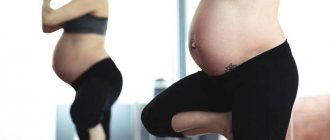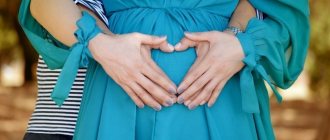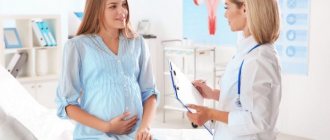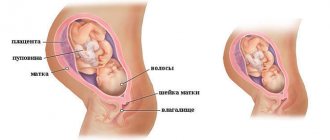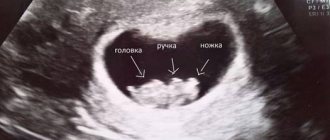18th week of pregnancy: your baby's development
This week, the baby gets something that will distinguish him from everyone else: fingerprints.
The fatty bumps on the tips of the fingers and toes develop into curls, the pattern of which is unique to each person. The formation of the digestive system has been going on as usual for several weeks now. The amniotic fluid your baby swallows passes through the stomach and intestines. From this fluid, as well as from dead cells and intestinal secretions, meconium is formed - the black, viscous, tar-like substance that you will see when you change your first diapers.
Around the 18th week, the baby's ears become visually more noticeable, and sometimes the baby may even begin to perceive sounds.
Bile is needed to digest nutrients, so at 18 weeks the gallbladder may begin to work.
What's happening to the baby?
Under the thin, smooth skin of the fetus, which has a reddish color due to translucent blood vessels, the formation of fatty tissue begins. The skin itself is covered with a protective lubricant that allows it to resist the action of amniotic fluid. The body proportions have changed so much that the child's appearance is very similar to a newborn baby. Small fingers and toes already have phalanges and skin patterns.
Fetal parameters at 18 weeks:
- Weight – 200 g;
- KTR (coccygeal-parietal size) – 14 cm.
In the brain, myelin sheaths begin to form, covering nerve fibers. The nervous system controls the movements of the fetus, they become so active that the expectant mother can now feel them. The baby reacts to the bright light of a lamp brought to the mother’s stomach, although his eyelids are still closed, and also distinguishes the nature of the sounds coming to him. He is frightened by loud noise and screaming, shuddering and making sudden movements, and calms down in response to gentle gentle intonations and melodic music.
The endocrine system improves, the child develops the rudiments of future immunity - the body produces its own interferon and immunoglobulin. The gender of the unborn child is no longer a secret; now it can be easily distinguished during an ultrasound scan.
What happens to the mother's body at 18 weeks of pregnancy
If this is your first pregnancy, then very soon you will feel slight movements in your stomach - fetal movements.
As the baby grows, the movements may become more intense, and in subsequent weeks, tremors may be felt. Every mother is different: some notice the first movements earlier (which often happens if you already have children), while others notice them later. So, if you don't feel any movement at 18 weeks of pregnancy, don't worry.
At this stage of pregnancy, a redistribution of circulating blood volume occurs in the body. Blood volume increases and blood vessels dilate rapidly, which can lower blood pressure. Blood flow to your head and upper torso is reduced, which can make you feel dizzy.
As early as week 18, you will probably notice that your legs have become larger. This is partly due to swelling, which occurs due to water retention in the body, starting in the second trimester.
To reduce swelling, take cold foot baths and periodically elevate your feet. Don't be alarmed if you have to buy larger shoes (and enjoy the upgrade!).
If you are currently 18 weeks pregnant, you have most likely just entered the fifth month of your pregnancy.
Necessary exercises
At 18 weeks of pregnancy, it’s time to start doing an exercise that will help maintain the contents of the abdominal cavity and prevent prolapse of the uterus or bladder after childbirth. Pregnant women are recommended to master the technique of performing Kegel exercises; this will make labor easier and help “push” the baby out of the birth canal. To do a Kegel exercise, find a flat, hard chair and sit upright in it. The support should be on the pelvic bones, the sacrum should not be loaded. Squeeze the muscles of the perineum, pulling them in and up. Try to hold the muscles in this position for 10 seconds, then completely relax and release the muscles. Breathe calmly, no need to hold your breath. Repeat 5 times, gradually increasing the number of repetitions to 10 times. Do this exercise 2-3 times a day.
18th week of pregnancy: pregnancy symptoms
Here are some symptoms you may experience during your 18th week of pregnancy:
- Attacks of dizziness.
Your heart works 40–50% harder than before pregnancy. This tension, as well as the pressure of the growing uterus on the blood vessels, can sometimes cause dizziness, especially when you suddenly stand up. Try to rest more often. If you feel lightheaded or dizzy, lie on your side. Dizziness can also be caused by low blood sugar. To restore your sugar levels, rest lying on your side or eat a piece of fruit.
- Movements.
Most women notice their baby's first movements between 16 and 20 weeks.
Your baby is still very small, so at 18 weeks the movements
will feel more like slight vibrations rather than powerful kicks
to the stomach
. - Leg cramps. At 18 weeks of pregnancy
You may
experience cramps in your calf muscles.
This usually happens in the evening and at night. It is recommended to stretch your calf muscles before going to bed and drink plenty of water. A warm bath, hot shower or massage can also help with cramps. - Problems with the nose.
During pregnancy, the body experiences a hormonal storm, blood volume increases, and this leads to swelling of the mucous membranes. This is the reason why sometimes pregnant women experience nosebleeds or a feeling of nasal congestion.
- Back pain.
The belly is growing, hormonal levels are changing - all this can cause pain in the lower back.
Visiting an obstetrician-gynecologist
At the 18th obstetric week of pregnancy, a woman can have a scheduled appointment with a gynecologist. Before the appointment, it is necessary to take urine and blood tests (directions were issued at the previous appointment).
The doctor will conduct an examination on the chair, measure temperature, blood pressure, weight and abdominal circumference. Conduct a survey about your well-being and changes that have occurred since the last meeting. Listen to the fetal heartbeat through a stethoscope.
At the end of the appointment, he will issue directions for the next tests and set a date for the second screening.
If everything is fine with the tests, the gynecologist may advise you to see a dentist, if necessary. Now is the time to check the condition of your teeth and, if necessary, carry out minor treatment.
Visiting the doctor at 18 weeks
Ultrasound and tests
A routine ultrasound and “triple test” (blood test) can be scheduled at 18 weeks of pregnancy. The main purpose of the study is to identify possible abnormalities in fetal development.
During an ultrasound, the doctor examines:
- position of the fetus in the uterus;
- fetal bone structure, correspondence of parameters to gestational age;
- the condition of the internal organs of the unborn child, compliance with the deadline;
- place of attachment of the umbilical cord, its condition;
- volume of amniotic fluid;
- cervical condition;
- main parameters of the fetus: head circumference (HC), length of the femur (HB) and humerus (HB), width of the head from temple to temple (BPR).
At the current stage, if the unborn baby is in the right position, doctors can name his gender. The probability of an error at the current time is low.
The triple test at 18 weeks of pregnancy is the 2nd screening test. In some cases, the doctor may not prescribe it if there is no indication. But it is not necessary to worry prematurely if the gynecologist talks about the need for this study. A triple test at 18 weeks of pregnancy measures the levels of:
- hCG;
- free estriol;
- alpha-fetoprotein.
Based on the results of this analysis, the doctor can make a conclusion about possible congenital diseases in the unborn child. If the results are not very good, additional invasive tests will be suggested.
Uterus and belly
At the 18th week of pregnancy, the uterus continues to increase in size. At the current stage, it has risen by 17-19 cm. The belly is almost under the navel and can no longer be hidden under loose clothing.
At the current stage, you can already see which side of the abdominal cavity the unborn child is on. The abdomen shifts slightly in the right direction and looks uneven.
Pain in the abdomen and other parts of the body
At the 18th week of pregnancy, pain may normally be present, but a woman needs to clearly know what sensations should alert her and force her to urgently consult a gynecologist for medical help.
Stomach ache
Very often, at the 18th week of pregnancy, a woman experiences discomfort in the abdominal area. If the manifestations are not severely painful and are accompanied by itching, then most likely this is caused by stretching of the abdominal muscles. You should talk about this symptom at your next appointment with a gynecologist.
If there are painful sensations in the abdomen and back, accompanied by tension across the entire surface of the abdomen (it seems to be turning to stone), then most often we can talk about the tone of the uterus. If the pain appears once or after a long walk or physical activity, then you need to talk about it at your next appointment. If you experience frequent pain, you should consult a gynecologist in the coming days. You may need to take additional medications to relax the muscles of the uterus.
Severe and/or cramping pain is a reason to immediately seek medical help to identify the causes.
Leg pain
Pain in the legs can be caused by various reasons: from fatigue to varicose veins. The doctor must identify the source of the discomfort. Before your next appointment, it is advisable to:
- rest more often with your legs raised high;
- reduce the amount of salt consumed to a minimum;
- engage in permitted physical activity (swimming, walking).
Back pain
In most cases, discomfort in the back during the current week of pregnancy is caused by physical fatigue and a change in the center of gravity. If they are not accompanied by abdominal pain or other unpleasant symptoms, it is advisable to give your back rest and start wearing a prenatal bandage. At your next appointment, tell your gynecologist about the sensations you are experiencing.
If back pain is localized on the sides, accompanied by discomfort when urinating, uterine tone or other symptoms, you should consult a gynecologist for advice. Be sure to take a urine test before taking it.
Headache
Most often, headaches in the 18th obstetric week of pregnancy are caused by changes in blood pressure. The occurrence of this symptom should be reported to the doctor at your next appointment.
In addition to the indicated types of pain, at the 18th week of pregnancy, a woman may experience manifestations of hemorrhoids, carpal tunnel syndrome, pain in the feet, and thoracic spine. You should definitely tell your doctor about any pain you experience at your next appointment.
Discharge
The amount of vaginal discharge may increase significantly during the 18th week of pregnancy. Normally, their color should be light or milky, the smell should be barely perceptible sour. Any change in color, consistency or smell should be reported to your gynecologist.
If a woman notices red or brown discharge or clots of pus, she should immediately seek medical help.
Bleeding and menstruation
There should be no bleeding or menstruation at week 18. Any appearance of blood or red or brown discharge is a reason to urgently seek medical help.
18th week of pregnancy: what to look for
- Eat foods rich in omega-3 polyunsaturated fatty acids. Nowadays it is very important to get nutrients for two at once, and omega-3 fatty acids are an essential component of a healthy diet. Omega-3s help develop the nervous system of the unborn child. According to research, these acids also strengthen the mother's immune system and help cope with symptoms of depression. Choose foods that are high in omega-3s: fatty fish such as salmon, plant sources such as flaxseeds, broccoli and walnuts. You can find even more information on how to eat healthy during pregnancy in our pregnancy guide.
- Gradually increase your caloric intake. A growing baby will need a lot of calories, but that doesn't mean you have to eat for two. In the second trimester, you can add 300 calories (that's half a sandwich and a glass of skim milk) to your average 2,000-calorie diet per day. When adding calories to your diet, find out what weight gain is acceptable during pregnancy, because this is a common cause of worry for expectant mothers!
- Suddenly, everyone around you - from your mother-in-law to passers-by on the street - will start giving you advice on how and what to do during pregnancy. Although unsolicited advice can be annoying, treat it philosophically. You don't have to make excuses to anyone. Use the universal answer: “Thank you, I’ll keep it in mind for the future.” And don’t forget that your advisors really want the best for you and are happy for you. Perhaps some advice for expectant mothers will really be useful.
Maternal nutrition and other recommendations
The mother's diet should be healthy, balanced and rich in vitamins and minerals. Products that should be present in the diet:
- Fresh vegetables and fruits, cereals. They are rich in vitamins and microelements necessary for the full development of the fetus. Fiber helps relieve constipation that occurs due to intestinal compression by the uterus.
- Dairy products. Cottage cheese, kefir, yogurt, and cheese are rich in calcium, which is so necessary for the formation of musculoskeletal tissue. They saturate the intestines with beneficial bacteria that stimulate its functioning.
- Lean meat and fish. This is a source of protein - the main building component of cells.
- Iron-containing products. These include beef liver, buckwheat, pomegranate and pomegranate juice, tomatoes and tomato juice, apples.
- Products containing folic acid. Few foods contain vitamin B9. These are beans, wholemeal bread, liver, honey.
You need to avoid or limit your use of:
- Allergenic products (citrus fruits, honey, chocolate). It is allowed to consume no more than 1 tangerine or orange per day, a couple of teaspoons of honey per day and 50 g of chocolate, preferably dark.
- Oily fish and cod liver. These foods are rich in vitamins and fatty acids, but an excess of them is just as harmful to a growing fetus as a lack. You are allowed to consume 200-300 g of fish per week and 1 small piece of cod liver per month.
- Coffee should be limited to 2 cups per day. It affects blood pressure, so the drink should be consumed weakly.
- Alcohol. Alcoholic beverages are prohibited from being consumed in any quantity. Occasionally, doctors make an exception for a glass of wine.
- Beans, cabbage. Why should such healthy foods be excluded? Pregnant women in the second trimester should limit the consumption of foods that cause excessive gas formation - the swollen intestines will put pressure on the uterus.
It is recommended to avoid physical activity, but in the middle of the second trimester you can find a fitness group for pregnant women. Special exercises will help cope with the additional load on the spine, strengthen the muscles and make them more elastic, and will prepare the woman for childbirth.
Despite the fact that the period is still short, you should consult with an obstetrician-gynecologist before traveling on an airplane. If the doctor believes that there is a threat to the child, you need to choose another transport.
Shoes must be changed to comfortable ones without heels. Such models are safer; in addition, pregnant women often develop varicose veins, which can be aggravated by wearing heels. To prevent stretch marks from appearing on the stomach, the skin should be lubricated with oils and moisturized.
Weight
If from the first days of pregnancy a woman gained no more than 5.5 kg until the 18th week, this is considered normal. Maintaining optimal weight gain will help make pregnancy easier and bounce back faster after childbirth. Overweight women are more likely to have pregnancy pathologies due to excessive stress on all organs, experience difficulties during childbirth, and take longer to recover after it.
If necessary, you need to seek help from a nutritionist to create an individual diet that helps maintain optimal weight and does not limit the baby in nutrients.
Screening, ultrasound and other examinations at week 18
If a woman has not yet had a second trimester screening, she has several weeks left for this important examination. The second screening to determine possible fetal pathologies is carried out from 14 to 20 weeks. Ultrasound at this stage is done for medical reasons, that is, when problems arise in the development of the fetus.
"Triple test" of the second screening:
- Blood test to determine the level of hCG;
- Test for alpha-fetoprotein content;
- Calculation of free estriol in the blood.
Deviations of the data obtained in the second screening from the norm indicate possible fetal pathologies - hydrocephalus, Down syndrome, anencephaly, Edwards syndrome, cranial hernia. Non-standard results are not yet a reason to make an accurate diagnosis. You should consult a geneticist and perform additional tests recommended by your doctor.
If an obstetrician-gynecologist has prescribed an ultrasound, during the procedure you can determine the baby’s gender, the presence or absence of developmental defects, and his body parameters:
- Head circumference;
- Torso circumference;
- Length of the tibia, femur, humerus, forearm;
- Fronto-occipital size.
If the screening was completed earlier, when visiting the antenatal clinic at week 18, the woman takes a standard blood and urine test to assess the general condition of the body. The obstetrician-gynecologist will measure the height of the uterus, blood pressure, weight of the pregnant woman, and listen to the fetal heartbeat.
Video about the sleep and wakefulness of the fetus, its development, clothes for pregnant women, and vacations:

